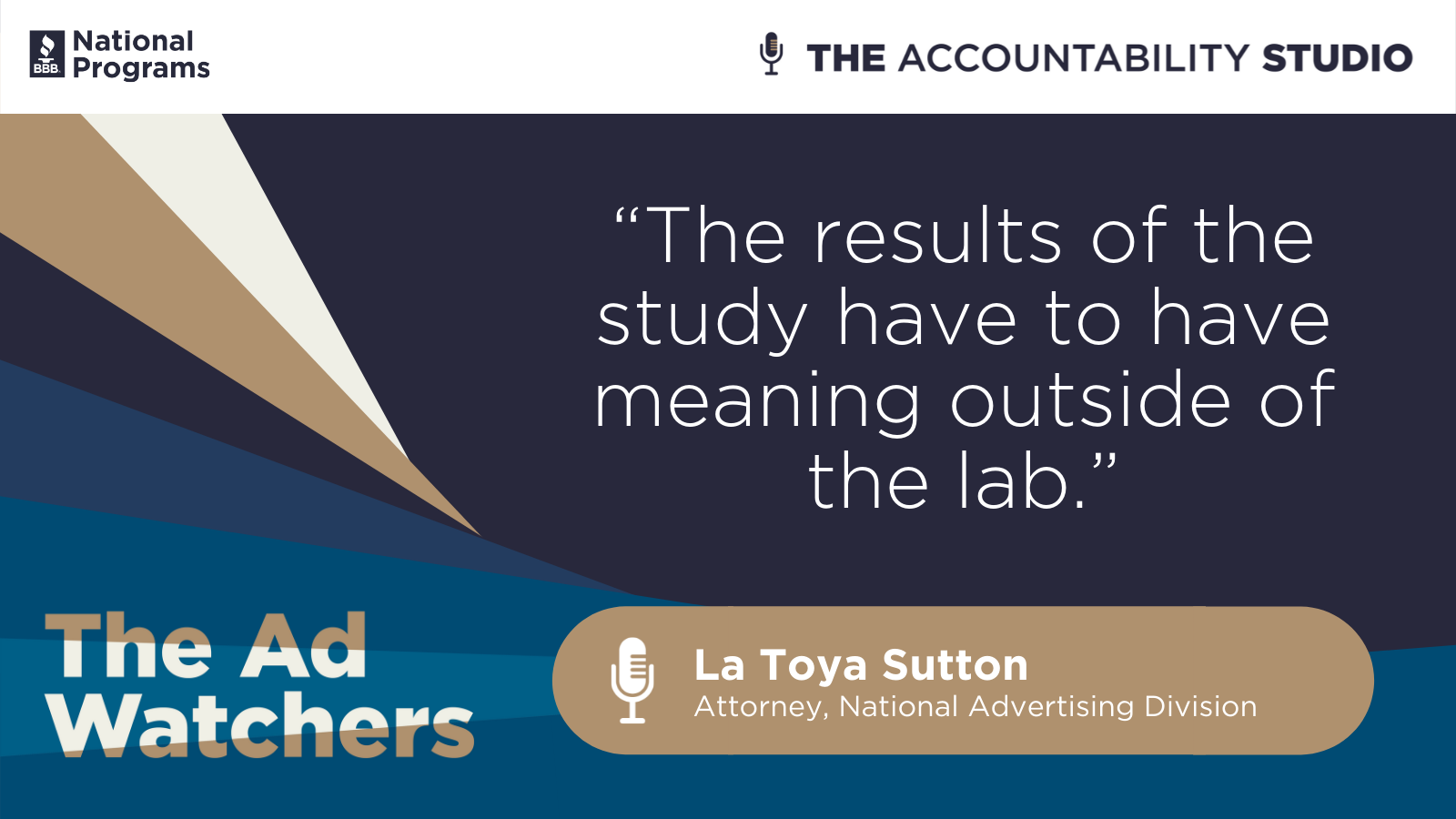
In the final episode of season one of Ad Watchers, the National Advertising Division (NAD) of BBB National Programs podcast series, hosts Hal and La Toya discuss health claims. These are any claims related to human health or wellness. These claims have a unique position in advertising claims substantiation because they require competent and reliable scientific evidence, also known in the industry as “CARSE.”
Hal and La Toya walked listeners through two key understandings of CARSE: how the Federal Trade Commission (FTC) often defines it and how, based on that definition, NAD boils it down during cases.
- FTC: “Tests, analyses, research, studies, or other evidence-based on the expertise of professionals in the relevant area, that have been conducted and evaluated in an objective manner by persons qualified to do so, using procedures generally accepted in the profession to yield accurate and reliable results.”
- NAD: “CARSE usually means human clinical trials on the actual product that’s being advertised that are methodologically sound, meaning they’re double-blind, placebo-controlled and randomized, and that have statistically significant to the 95% confidence level results that are consumer meaningful and relate directly to the promised performance benefits.”
As they explained, the intent is to have results that reflect how the product will work in practice. Hal stated that when there is a claim about human health, the studies or evidence should focus on how a product benefit works in humans. He emphasized that without a study on humans, there needs to be a strong reason that supports why the evidence alone will do what it says. He also addressed other components.
La Toya reminded listeners that, just as they said in the first episode, NAD does not make the rules. When addressing health claims, they are not trying to take the place of scientists or get ahead of scientists and experts in the field. Instead, the focus is on determining if studies meet the established scientific standards and whether they are a good fit as support for advertising claims.
After laying the groundwork for the episode, Hal and La Toya shared what they think and talk about when considering what makes a good study.
- Consumer Meaningful Results. As a consumer protection-focused organization, La Toya shared how NAD looks for the results of a study to have value outside of the lab. She provided two examples regarding claims about fragrance products and dietary supplements.
- P-Hacking. Hal and La Toya both explained that they do not look to accuse anyone of P-Hacking, which is a “phrase that is used in the scientific community where a study is designed to get that 0.05% statistical significant result on something.” However, it is still important to consider because NAD will always do a reliability check separate from confirming the P-value on one metric.
- The Population of a Study. When discussing this consideration, La Toya explained that “simply put the people that were studied should match the people that are the target of the advertising.”
- The Role of Placebos in Scientific Studies. Hal discussed that there not only needs to be a placebo, but it also needs to be utilized and studied. “If you have a placebo group, use it in analyzing your data and determining if it’s significant.”
- The Use of Experts in Establishing Scientific Consensus. The Food and Drug Administration (FDA) has shared that “just having expert opinions or their reports on an issue alone, is not a substitute for competent and reliable scientific evidence.” Both are needed, which is something NAD looks for in cases.
- The Design of Scientific Studies. The design of scientific studies can have tension with consumer meaningfulness. As a result, Hal explained that NAD recognizes that there is a “give and take in making sure that your study has reliable results and good data, and ensuring that it’s consumer meaningful.”
After going through these considerations, La Toya cautioned advertisers that they should not issue a claim that goes beyond what they have demonstrated in their study. She then reminded listeners that the analysis they discussed during the episode for claim substantiation “is separate from any other meeting of regulatory requirements. Many products that are in the health and wellness space particularly are subject to the regulations of the FDA, EPA, and just other government regulatory bodies.”
In their final remarks of the episode, Hal and La Toya thanked listeners for tuning in to the first season of Ad Watchers and reminded them that they could visit the BBB National Programs website for more information about NAD and other self-regulatory programs. They also teased up the return of Ad Watchers in 2022.
Visit to Learn More: NAD FAQ’s
Contact Information: nad@bbbnp.org

